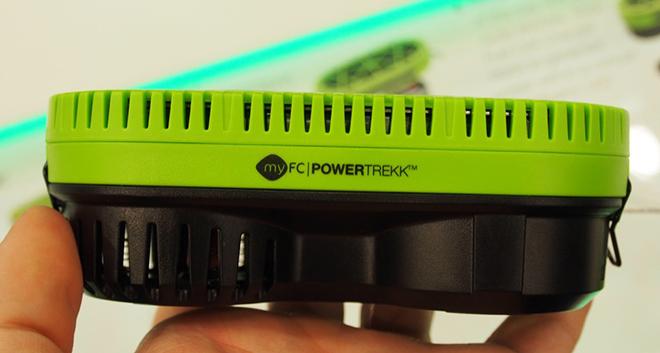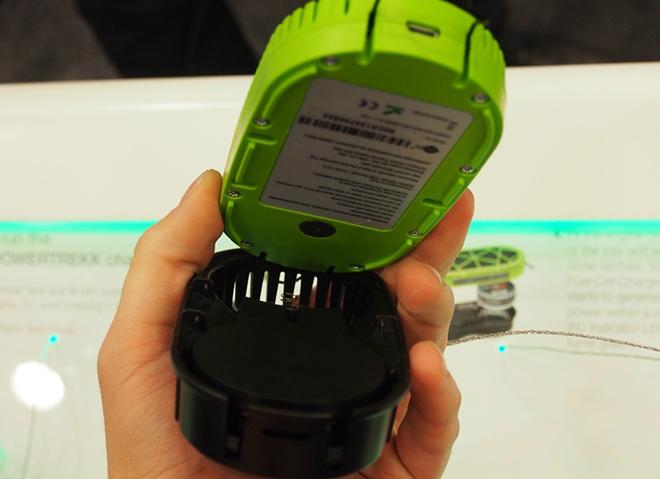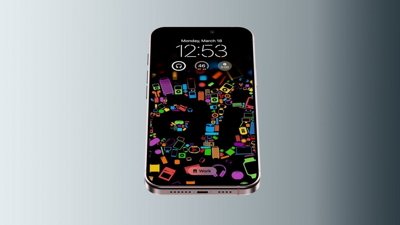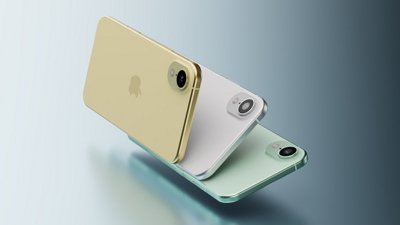MyFC made headlines two years ago when it unveiled a portable fuel cell charger, the PowerTrekk, however the promise of a spring 2012 release has now turned into a spring 2013 target.
We were surprised to see the company at the Macworld expo this week, after passing off the concept as a good idea that wasn't ready for the market, so we decided to stop by the booth to take a second look at the unique technology and reconsider its practicality.
The PowerTrekk charger takes advantage of the same concept utilized in prototype fuel-cell vehicles, producing electricity through a chemical reaction between hydrogen and oxygen. The portable system requires single-use "pucks" to separate the necessary hydrogen from water, which is added by the user.
The company promotes the technology as a competitor to solar, eliminating the need to maintain optimum sunlight exposure, and without the gradual degradation of batteries. Both points may be true, but we can't think of a realistic scenario in which the 10- to 15-year shelf life of typical batteries becomes a limiting factor.
For the ultralight backpacker, paying $100 for a few titanium pans and cutting the handle off a toothbrush is worth a few grams of weight reduction. The PowerTrekk pucks do feel very light, at 33 grams, and contain four watt-hours of energy, but this is nearly identical to the power-to-weight ratio for a 24-gram AA-size lithium-ion battery with 3.1 watt-hours of energy.
The PowerTrekk charger also contains its own lithium-polymer battery, providing 5.6 Wh of primary power before needing to switch to a puck when away from an AC outlet.
MyFC's technology is certainly unique, particularly in a portable form, but it still appears to be suffering the same setbacks that have plagued automotive fuel-cell implementation. Despite years of advancements and lower costs for fuel-cell technology, car manufacturers are continuing to push back their plans for commercialization. Many analysts view the technology as pointless and impractical in cars, which are arguably better suited to the higher efficiencies of battery storage.
Getting back to the PowerTrekk, we have the same doubts about the practicality of fuel cells as a portable charging solution. Anyone off-the-grid can spend $4 for a single throw-away puck (on top of the $229 price of the charger itself), or $4 for a pair of rechargeable lithium-ion batteries that offer a comparable power-to-weight ratio, higher capacity and in a smaller package. The pucks also can't be restarted, wasting the rest of the puck if a device or the internal battery is simply being topped off, and the listed operating temperature starts at 41 degrees Fahrenheit. Adding to the list of limiting factors, the company strongly warns against using the charger in a pocket, in a backpack or even covered with cloth.
Portable fuel-cells don't make sense to us, and we can't imagine it makes much sense to many other potential buyers. We could say that we're optimistic about improvements and marketability in the near future, but we've been hearing that broken promise from car companies for decades.
This report was originally published by Electronista.
 Kevin Bostic
Kevin Bostic















 Christine McKee
Christine McKee
 Malcolm Owen
Malcolm Owen


 Amber Neely
Amber Neely
 Andrew O'Hara
Andrew O'Hara










4 Comments
I agree. I've been following this tech for years. It's one that's always a few years from being practical. Of course, that was said about flat screen Tv's, portable computers, etc. but they had serious advantages, such as size and thickness. But these don't offer much. As battery tech improves further, and there are developments that may come to market soon, fuel cell tech will need major improvements to compete.
I could see this being adapted in some perverted way by the Taliban. Insert sarcasm riiiiiight HERE>
Fuel cells should work on a catalytic concept, not with disposable cartridges. The way this should go is to have a catalytic converter fuel cell that takes regular, reasonably pure alcohol as a fuel (Vodka, grain spirits, scotch, white rum, etc.) In other words: if you have access to alcohol you have access to fuel, until many cycles later the impurities ruin the catalytic converters, and they must be changed. But to have some sort of chemical cartridge that splits water just to rejoin it in a fuel cell is like twisting yourself into a pretzel just to scratch your ear.
No doubt somebody in government would poo poo the idea of using alcohol this way. [quote name="rcfa" url="/t/155795/hands-on-powertrekk-portable-fuel-cell-charger/0_40#post_2271111"]Fuel cells should work on a catalytic concept, not with disposable cartridges. The way this should go is to have a catalytic converter fuel cell that takes regular, reasonably pure alcohol as a fuel (Vodka, grain spirits, scotch, white rum, etc.) In other words: if you have access to alcohol you have access to fuel, until many cycles later the impurities ruin the catalytic converters, and they must be changed. But to have some sort of chemical cartridge that splits water just to rejoin it in a fuel cell is like twisting yourself into a pretzel just to scratch your ear.[/quote] Exactly ! Unless this report has the technology wrong the approach is totally assinine. In fact burning your alcohol would make more sense.